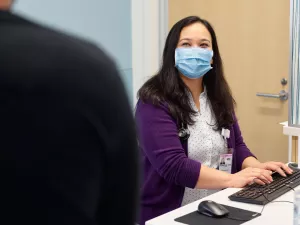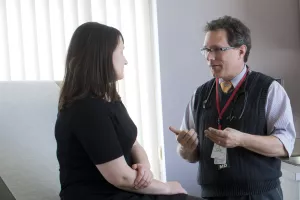Blood disorders, also known as hematologic disorders, affect 1 or more components of blood — plasma, platelets, red blood cells and white blood cells — by preventing blood from behaving as it should. We specialize in diagnosing, treating and developing new therapies for blood disorders like anemia, hemophilia and thrombotic diseases.
Difference between bleeding, clotting and blood disorders
Blood disorders can be challenging to navigate, and we understand that they can have a significant impact on your life. Whether you are dealing with a short-term or lifelong condition, we want to help you understand your situation better. To do that, it's important to know about the 4 major components of blood and how they affect your overall health:
- Plasma: This liquid component of your blood transports essential nutrients, hormones, and proteins throughout your body while removing waste.
- Platelets: They are responsible for clotting your blood, which is crucial for your body's healing process.
- Red blood cells: They carry oxygen and carbon dioxide throughout your body, ensuring that your organs and tissues receive the necessary levels of oxygen.
- White blood cells: They play a vital role in protecting your immune system and keeping your body healthy.
No matter what you're going through, we're here to support you. We're here to answer your questions, address your concerns, and provide personalized care that maximizes your quality of life.

Treating blood disorders
We specialize in treating blood disorders. Our physicians work with your primary care physician to provide comprehensive care. Our nurse evaluates each patient, and our nurse practitioners manage side effects and educate patients and families. They update our doctors regularly.
Our team of board-certified hematologists, nurses, other specialists (depending on your condition) and your primary care doctor will work together to customize your treatment plan. Our hematologists work collaboratively with Tufts Medical Center specialists for blood-related disorders, providing care and services.
We specialize in caring for people with blood-related illnesses. Our main goal is to make sure that you feel comfortable and taken care of by providing individualized care and answering any questions you may have. Our in-house coagulation laboratory is top-notch and can accurately identify any unusual bleeding or clotting disorders.
Conditions
Our team of blood disorder specialists are experts in treating blood-related conditions. You can turn to us for help with these types of disorders, including:
Benign blood disorders
We’ve broken down the key differences between benign (noncancerous) hematologic conditions so you can better understand yours:
- Bleeding disorder: Your body cannot properly clot blood. Think about it like a cut that bleeds much more than normal.
- Clotting disorders: Your body clots blood more than it’s supposed to. When there’s too much build-up, or clotting, in your blood vessels, it can become very dangerous and lead to a stroke and other conditions.
- Blood disorders: One or more components of blood — platelets, plasma, red blood cells and white blood cells — don’t behave as they should. These can be cancerous blood disorders or noncancerous.
Noncancerous blood disorders can affect people in a variety of ways. Symptoms may last a lifetime, re-emerge over time or permanently disappear with therapy.
Several of the most common types of noncancerous blood disorders include:
- Anemia
- Deep vein thrombosis (DVT)
- Hemophilia
- Immune thrombocytopenic purpura (ITP)
- Sickle cell anemia
Blood cancers
Blood cancers, also known as hematologic cancer, are cancers that affect the blood, bone marrow or lymph nodes. If you suspect or know you're living with one of the following types of hematologic cancers, trust that our team will work hard for your wellness:
- Amyloidosis
- Hodgkin's and non-Hodgkin's lymphoma
- Leukemia
- Myelodysplastic syndromes
- Myeloma
- Myeloproliferative disorders
- Plasma cell diseases
Testing
Diagnosing blood disorders can be difficult due to their complex nature. However, our team is equipped to conduct various tests to understand your condition better. You will have the opportunity to meet with our hematologists for testing, which will be evaluated in our coagulation laboratory. If your results indicate that you have blood cancer, we will adjust your care plan to include both hematology and cancer treatments.
Treatments
We treat benign hematologic conditions with oral or intravenous medications and blood transfusions. Thanks to our on-site blood blanks, most of your care will be housed under one roof. Our doctors can even perform same-day red blood cell and plasma exchange procedures.
Because you can inherit benign hematologic disorders, we may recommend preconception and prenatal genetic counseling. This will help determine if you have a condition that can get passed down to your kids.
Your treatment plan will be based on how the affected blood components impact your health. Additional treatment options may include:
- Blood transfusion
- Bone marrow transplant
- Chemotherapy
- Clinical trials
- Immunotherapy
- Medication
- Radiation therapy
- Stem cell transplant
- Steroid regime
- Targeted therapy

From regular office visits to inpatient stays, find the healthcare you need and deserve close to home.

Meet the doctors and care team devoted to supporting you every step of the way along your path to better health.